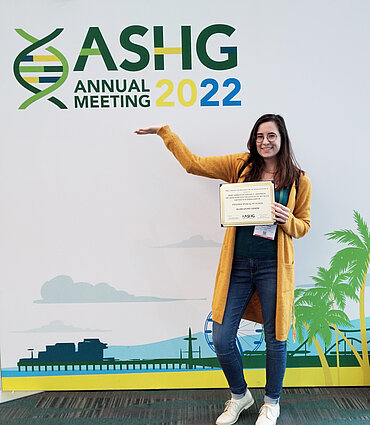Charles J. Epstein Award: Marianne Lemée is Laureate for Excellence in Human Genetics Research
Marianne Lemée, a doctoral student in the team of Christelle Golzio, Inserm research fellow, is one of the three winners of the Charles J. Epstein Prize in the doctoral student category, announced the American Society of Human Genetics (ASHG), in Los Angeles. This award recognizes the originality and quality of the doctoral student's research in the genetics of autism.

A prestigious award for promising research in the field of human genetics
Coordinated by the American Society of Human Genetics (ASHG), the Charles Epstein Award for Excellence in Human Genetics Research recognizes particularly promising projects conducted by doctoral and post-doctoral students. In 2022, more than 700 young scientists applied for the prize and 6 laureates were selected: 3 for the doctoral student category and 3 for the post-doctoral student category.
This prize "brings a very good visibility to the research of the scientists who receive it", explains Marianne Lemée. It is also accompanied by an endowment of $2000 (~1850 €). There had not been a French finalist for this prize in the doctoral category since 2008, with Sabina Benko, who was at the time a doctoral student at the Necker-Enfant Hospital in Paris.
Marianne Lemée, PhD student specialized in the regulation of neurodevelopment in autism spectrum disorders
Marianne Lemée arrived at IGBMC in January 2020 as a Master 1 student and started her PhD on the identification of autism-related genes in September 2021 at IGBMC, within the IMCBio program. This project aims to identify the gene responsible for neurodevelopmental abnormalities linked to chromosomal rearrangements on chromosome 1. These abnormalities are responsible for the 1q21.1 syndrome which induces autistic traits in patients who are carriers.
More precisely, Marianne Lemée's research has shown that the deregulation of the CHD1L gene, present in the region of the 1q21.1 syndrome, induces neurodevelopmental anomalies. This research reveals a new key role for this gene during cortical development. The project is now focused on elucidating the regulatory mechanisms of CHD1L in human cell models mimicking neurogenesis.
The overall goal of this work is to improve the management and diagnosis of individuals with 1q21.1 syndrome, to explore new therapeutic avenues and to better understand the genetics of autism.
Marianne Lemée, ready to present her poster to the jury. Credit: Wenhe Lin
